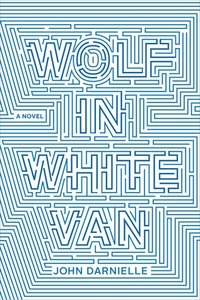You need to sign in or sign up before continuing.
Take a photo of a barcode or cover
An enthralling and sad story.
The narrator, Sean, almost never leaves his house. An incident of self-harm in his teen years leaves his face disfigured and his speaking voice garbled, and it's easier to stay indoors and away from the prying eyes of the world. As the creator and game master of Trace Italian, a text-based role playing game where players make their moves by mail, Sean's interactions with the outside world are limited to the version of it that he created.
The story unfolds slowly, and it is only in the final moments that we learn exactly how Sean came to be injured. In the present day, he is forced to leave his self-imposed isolation when two teenagers playing Trace Italian are injured, and one dies. The lines between the real world and the world we create in our minds is blurred, and the consequences of confusing the two are bleak. I enjoyed the narration and I thought this book was a thoughtful exploration of depression, imagination, anxiety, and survival. It was unlike almost anything I've read. This would be a good one for book discussions because I think there are many interpretations. I'm interested in hearing from anyone who has read this :)
The narrator, Sean, almost never leaves his house. An incident of self-harm in his teen years leaves his face disfigured and his speaking voice garbled, and it's easier to stay indoors and away from the prying eyes of the world. As the creator and game master of Trace Italian, a text-based role playing game where players make their moves by mail, Sean's interactions with the outside world are limited to the version of it that he created.
The story unfolds slowly, and it is only in the final moments that we learn exactly how Sean came to be injured. In the present day, he is forced to leave his self-imposed isolation when two teenagers playing Trace Italian are injured, and one dies. The lines between the real world and the world we create in our minds is blurred, and the consequences of confusing the two are bleak. I enjoyed the narration and I thought this book was a thoughtful exploration of depression, imagination, anxiety, and survival. It was unlike almost anything I've read. This would be a good one for book discussions because I think there are many interpretations. I'm interested in hearing from anyone who has read this :)
challenging
dark
mysterious
reflective
sad
medium-paced
Plot or Character Driven:
Character
Strong character development:
No
Loveable characters:
Complicated
Diverse cast of characters:
No
Flaws of characters a main focus:
Yes
Reminded me a lot of Remainder, another short book about a man's circular obsessions and isolation after a catastrophe that leaves him with a lot of time on his hands and little connection to the outside world. I enjoy John Darnielle's prose writing style, just as I enjoy his music with Mountain Goats, but this felt a little scattershot to me, a bunch of ideas in search of a theme or meaning. That seems to be very deliberate—the idea of circling a point conversationally without ever getting there comes up a couple of times within the book, and the protagonist's main occupation is a play-by-mail role-playing game he designed to be nigh-endless, with no one ever reaching the theoretical final stages. It feels like this book is, in a way, about aimlessness and lack of satisfaction, about how life drones on without simple narrative answers no matter what you do. But making that into a motif doesn't make it any more satisfying, especially at the rather abrupt end, which leaves some things unsaid that could really have stood to be said.
Väga hea; eri kihid on nii sassis, et peab rahulikult lugema, et aru saada, mis kuhu kuulub (ja lõpuks sel liiga palju tähtsust polegi). Ja see on ju noortekas, teismeliste elust, ehkki ei oska arvata, kas see tegelikele teismelistele ka meeldiks.
Some of the best prose I've read in awhile. Typically, I struggle not to speed read books, but with Darnielle's book, I savored every word and phrase. He's a master of painting a picture, or of unlocking an image. The story itself is haunting, and my only nit is that the second half isn't as cohesive as the first. But still, an enjoyable book I would recommend.
I love the mountain goats music, and was pleasantly surprised by how Darnielle's genius translated into prose. This was a fantastic and totally unique story. The worlds that were built in it were imaginative and charming, and the main character was one of a kind. I would have loved more of Lance and Cassie's story woven into Sean's, it felt like something was missing and I think it was their perspective.
adventurous
reflective
medium-paced
Plot or Character Driven:
Character
Strong character development:
Complicated
Loveable characters:
Complicated
Diverse cast of characters:
No
Flaws of characters a main focus:
Yes
A frustrating read at times; Sean is a difficult narrator. Its shortness makes that endurable, though, and the story is worthwhile.
Sad, disturbing, engrossing, intriguing--lots here to dig into about how we use stories and imagination to survive. Those unsympathetic to the loneliness of young men might not appreciate the rendering of the main character but I felt him.
I've enjoyed John Darnielle on a few podcasts, and listened to a little bit of Mountain Goats. He's an interesting guy.
But this book is brilliant. Dense but accessible, twisty but clear, devastating but hopeful. Intricate and sweet and terrible.
I can't do much more to describe it, however. It feels too different than anything else I've ever read.
And while I highlighted a few passages of great writing, it comes at you in waves, with too much momentum to stop and record. Can't wait for his next books.
(Here are a few lines I highlighted)
The screen throbbed in its familiar way and the darkness around it spread out to the farthest corners of the room.
It was the product of someone’s hard work, a vision brought into the world of real things.
I hated how much I needed all the help they gave me, hated needing to call the nurse, hated feeling like my greatest success would be in making childhood my permanent condition.
He is like a jellyfish adrift in the sea, throbbing quietly in the warm waves of the surf just off the highway where the dusty white vans with smoked windows and indistinct decals near their wheel hubs roll innocently past.
It isn’t really much of a mystery, this occasional need I have to comfort my father. I did something terrible to his son once.
But this book is brilliant. Dense but accessible, twisty but clear, devastating but hopeful. Intricate and sweet and terrible.
I can't do much more to describe it, however. It feels too different than anything else I've ever read.
And while I highlighted a few passages of great writing, it comes at you in waves, with too much momentum to stop and record. Can't wait for his next books.
(Here are a few lines I highlighted)
The screen throbbed in its familiar way and the darkness around it spread out to the farthest corners of the room.
It was the product of someone’s hard work, a vision brought into the world of real things.
I hated how much I needed all the help they gave me, hated needing to call the nurse, hated feeling like my greatest success would be in making childhood my permanent condition.
He is like a jellyfish adrift in the sea, throbbing quietly in the warm waves of the surf just off the highway where the dusty white vans with smoked windows and indistinct decals near their wheel hubs roll innocently past.
It isn’t really much of a mystery, this occasional need I have to comfort my father. I did something terrible to his son once.





